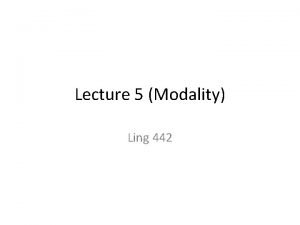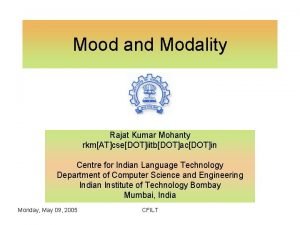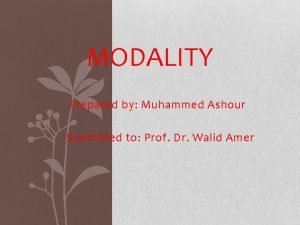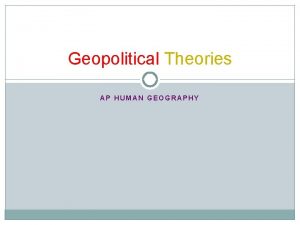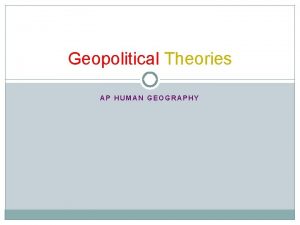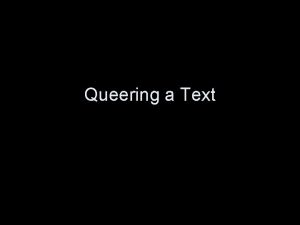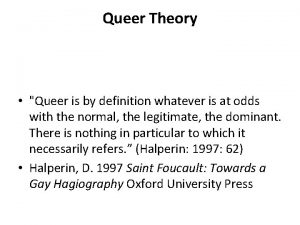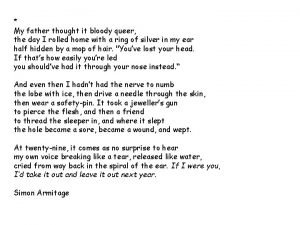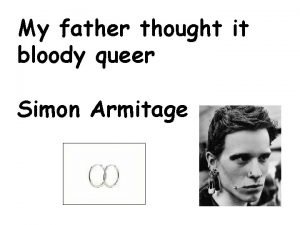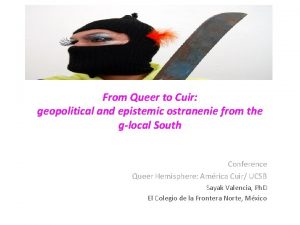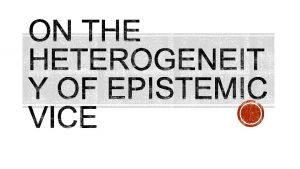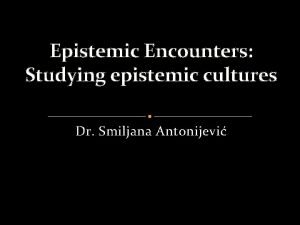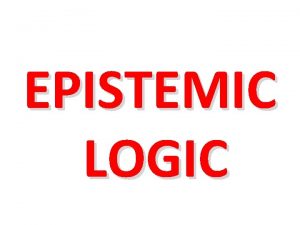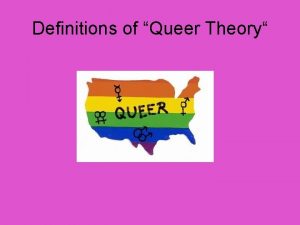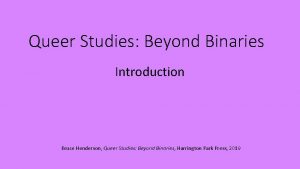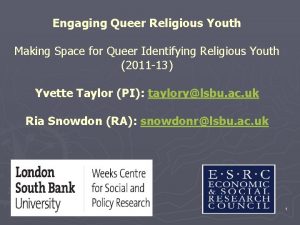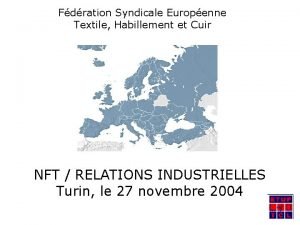From Queer to Cuir geopolitical and epistemic ostranenie





![• The verb "to twist" [torcer in Spanish] comes from the Latin torquere, • The verb "to twist" [torcer in Spanish] comes from the Latin torquere,](https://slidetodoc.com/presentation_image_h/13b9c48300145d2467db249b991b40e4/image-6.jpg)

















- Slides: 23

From Queer to Cuir: geopolitical and epistemic ostranenie from the g-local South Conference Queer Hemisphere: América Cuir/ UCSB Sayak Valencia, Ph. D El Colegio de la Frontera Norte, México

"Queer could be translated as: strange, indisposed, collapsed, crazy, excentric, bizarre, outlandish, suspicious, mysterious, fake; while queerness means something like rarity, weirdness, ridiculousness. " (Debate Feminista, 1997, p. IX).


(Possible) etymologies of the term queer • The Online Etymology Dictionary locates the term at the beginning of the 16 th century, its root is probably Germanic, and it derives from the Lower German (the Brunswick dialect) quer, which refers to the oblique, decentered, twisted, perverse and weird. In turn, this term comes from the High German twerh, which means oblique, and this derives from the proto-Indoeuropean root, "terkw", meaning: to turn around, twist, rotate.

![The verb to twist torcer in Spanish comes from the Latin torquere • The verb "to twist" [torcer in Spanish] comes from the Latin torquere,](https://slidetodoc.com/presentation_image_h/13b9c48300145d2467db249b991b40e4/image-6.jpg)
• The verb "to twist" [torcer in Spanish] comes from the Latin torquere, which properly means "to rotate, turn around". It derives from the root tark- or tork, which means "to move". So to twist is to turn around or spin, deviating from the original direction. It is important to highlight this Indoeuropean origin, which links it to Latin, to which we will return in the following paragraphs to decenter the alleged copyright that weighs on the term, considered to be exclusively Anglophone.


• In its first written registries in Scottish language, which date back to 1500, queer references the weird, peculiar and excentric. • However, different semantic and temporal shifts will transform the term to adopt the meaning of shocking, ridiculous, tricky (1790), as well as to spoil and ruin (1812). • However, it is not until the 20 th century that the term is used in a despective way to enunciate male homosexuality, the first mention in this sense dating from 1922, and the use of the term as a substantive from 1935.


The origins of the queer movement • The official version situates its theorical usage in 1991, when Teresa de Lauretis published her emblematic article “Queer Theory. Lesbian and Gay Sexualities. ” in the magazine Differences. However, and maybe following the same white logic of academic capitalism that hides minority contributions, the use that Gloria Anzaldúa makes of it in her book Borderlands/La Frontera, published in 1987, was not considered "theoretical".


The copyright of the term queer • The use of the term queer in Latin America has unleashed important controversies and critiques featuring some Latin American scholars such as Norma Mogrovejo (2012) and North American ones such as Brad Epps (2008). They both oppose the use of the term although from different perspectives.


Cuir: geopolitical and epistemic ostranienie • I grew up hating the South. It was mandatory to hate it and we all did. My generation's joke was that our favourite martial art was Have-to-go. We were brought up to despise the place where we grew up. We were brought up to find it ugly, small, miserly. However, every time I am lost, I come back to it. • "Yo crecí odiando el Sur. Había que odiarlo y todos lo hicimos. El chiste de mi generación era que nuestro arte marcial favorito era el Ai-ki-irse. Nos educaron para despreciar el lugar donde crecimos. Nos educaron para encontrarlo feo, chico, mezquino. Y sin embargo, cada vez que estoy perdido, vuelvo a él. " Daniel Villalobos. El Sur. (2014: 130)

• "Cuir" is then proposed as the Hispanicised phonetic derivation (deviated/improper) of the term queer.


• "Cuir" also seeks to make visible some strategic uses of epistemic disobedience, proposing —against traditional enunciation methodologies of Modernity/Coloniality— other methodologies of a decolonial character that show the discursive interests —already existing in Southern and mestizx g-local geopolitics— about the imagery renovation of social insubordination through (trans)feminist and sexually dissident practices as pacifist practices of organised civil disobedience.


• The "cuir" shift also talks about a geopolitical content and a radical criticism coming not only from sexual peripheries but also from economic, racial, gender, body and functional diversity peripheries, that are not displaced premises but fundamental enclaves in the conformation of politcs of intersectional resistance.

• "Cuir" represents an ostranienie (unfamiliarisation) of the term queer, that is, a de-automation of the reading glance, and it registers the geopolitical turning point towards the South and the peripheries as a counterattack against the colonial epistemology and Anglo-American historiography. Thus, the shift from queer to "cuir" refers to a locus of enunciation with a decolonial inflection, both ludic and critical.


Conclusion • The shif of the term queer into "cuir" leads us to reconceptualise a political philosophy of activism that refutes the current situation of global inequality, giving continuity to decolonial fights and the transfeminist perspective. Showing a means of articulation between daily insurrections, which proliferate in the urban miscellaneous landscape of gore capitalism (Valencia, 2010), and topics related to the subversive use of: gender, language, sexuality, racism, functional diversity, impoverishment, ecology, etc. Detonating the orthodoxy of what can be currently considered as political agency.

Thank you!
 Cuir queer
Cuir queer Deontic and epistemic modality exercises
Deontic and epistemic modality exercises Anomalie du cuir chevelu
Anomalie du cuir chevelu Dcubitus
Dcubitus Generation cuir mazamet
Generation cuir mazamet Modality
Modality Epistemic modality
Epistemic modality Knorr cetina epistemic cultures
Knorr cetina epistemic cultures Geopolitical definition ap human geography
Geopolitical definition ap human geography Geopolitics ap human geography
Geopolitics ap human geography Rimland theory ap human geography
Rimland theory ap human geography What is this font
What is this font Queer farmers
Queer farmers Queer theory meaning
Queer theory meaning My father thought it poem
My father thought it poem Queer meaning
Queer meaning My father thought it bloody queer analysis
My father thought it bloody queer analysis Mad gab rules 2 players
Mad gab rules 2 players Theory of literature notes
Theory of literature notes Queer ramshackle house
Queer ramshackle house Arkitaypal
Arkitaypal Queer
Queer What is queer
What is queer Red orange yellow green blue purple pink black white grey
Red orange yellow green blue purple pink black white grey

